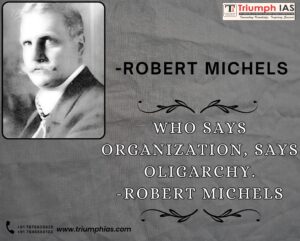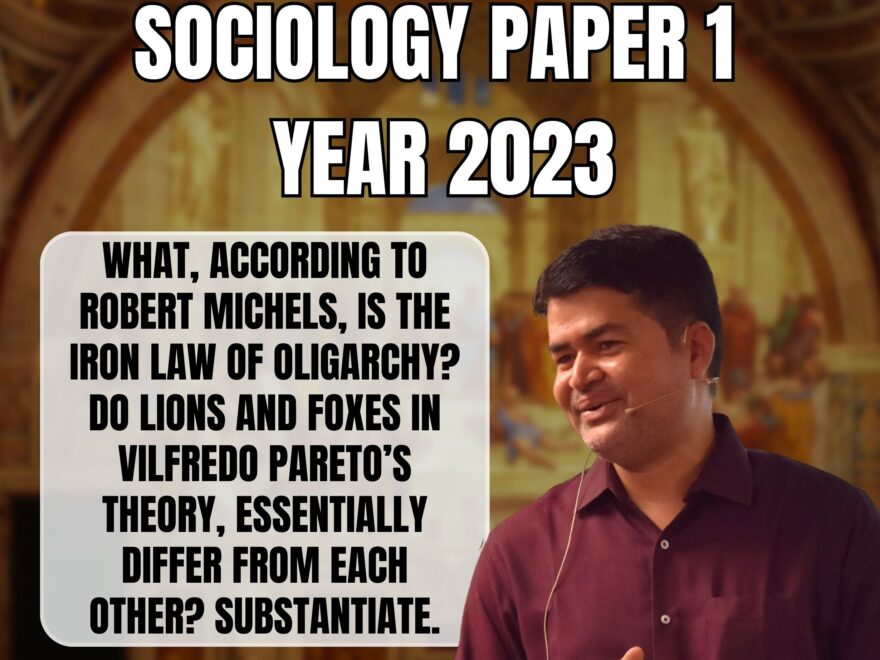What, according to Robert Michels, is the iron law of oligarchy? Do lions and foxes in Vilfredo Pareto’s theory, essentially differ from each other? Substantiate.
Section: A.
Sociology Paper 2023 Analysis.
Relevant for Paper 1: Unit-7 Politics and Society

Question 2 (A): What, according to Robert Michels, is the iron law of oligarchy? Do lions and foxes in Vilfredo Pareto’s theory, essentially differ from each other? Substantiate.
(20 Marks)
|
Introduction: Explain the Iron Law of Oligarchy by Robert Michels. Main Body: Briefly Provide Context of Vilfredo Pareto’s Theory of Circulation of Elite, Then Explain the Psychological Features of Foxes and Lions to Differentiate Them . Conclusion: Significance of the Both Concepts Iron law of Oligarchy and Foxes and Lions to Explain Modern day Phenomenon of Power Dynamics. |
Introduction:
Robert Michels spelled out the iron law of oligarchy in the first decade of the 20th century in Political Parties. According to this theory, all forms of organisation, regardless of how democratic or autocratic they may be in the beginning, will eventually and inevitably develop oligarchic tendencies.
Main body:
Explanation of iron law of oligarchy.
- Michels argued that organizational oligarchy resulted, most fundamentally, from the imperatives of modern organization: competent leadership, centralized authority, and the division of tasks within a professional bureaucracy. As an organisation grows, it becomes increasingly complex and requires a specialised division of labour. Organisation’s survival necessitates the development of a leadership class that gains more power and control over time, leading to a concentration of authority and the formation of an oligarchy.
- For example, in a political party, the party leaders, who are initially chosen democratically, amass increasing power, making unilateral decisions rarely questioned by members. Over time, the party becomes an oligarchy, ruled by a small group of powerful leaders.
- However Iron law of oligarchy can be dysfunctional also as it creates hurdles for entry of fresh talent in leadership. Oligarchy also monopolise power which leads to opacity, corruption and erosion of Democratic norms and processes.
Foxes and Lions in Vilfredo Pareto’s Theory of circulation of elites.
- Pareto was an Italian sociologist and economist, and his theory posits that society is characterized by a constant circulation of elites. He categorized these elites into two main types, the “lions” and the “foxes.”
- Vilfredo Pareto’s concepts of “lions” and “foxes” draw inspiration from Machiavelli’s “The Prince.” Machiavelli’s work emphasized strategic and ruthless political leadership, which Pareto adapted by categorizing elites as “lions,” who use force like Machiavelli’s ideal ruler, and “foxes,” akin to Machiavellian cunning and political maneuvering, reflecting the enduring influence of Machiavelli’s ideas on the understanding of elite dynamics.
Comparison of Lions and Foxes.
Lion:
- They are generally a residue of persistence. They are more They believe in gradual change in society. They don’t believe in rapid change and transformation as they emphasise on stability in society. They don’t mix very easily with society. They’re generally career politicians.
- Lions maintain their position through physical force or coercion. Lions are often found in government, military, or other institutions that directly exercise physical power. These elites use force to maintain their dominance.
Eg. Leadership of former USA president Barack Obama.
Fox:
- Pareto called them residues of combination. They are very cunning and believe in the principle of Maximum gain. They’re generally speculative in nature and advocate for rapid change and transformation. They don’t believe in the status quo. They easily mix up with people.
- Foxes are the elites who rely on cunning, manipulation, and intellectual skills to attain and maintain power. They operate in areas such as politics, finance, and diplomacy, where subtlety and maneuvering are more effective than raw physical force. Foxes use their wit and strategy to outmaneuver competitors.
Eg. Leadership of former USA president Donald Trump.
They both are essentially different from each other in theory but in practical scenario not mutually exclusive:
- While Lions and Foxes in Pareto’s theory represent different approaches to attaining and retaining power, it’s essential to recognize that these categories are not mutually exclusive. Individuals may exhibit traits of both lions and foxes, depending on the context and strategies they employ.
- While the lions use force and aggression, the foxes use cunning and manipulation. However, both are driven by the same desire for power and control.
Conclusion:
The iron law of oligarchy and the differentiation between foxes and lions in Pareto’s theory have significant implications for understanding modern power dynamics. These concepts help explain how organizations, governments, and societies are shaped by elite control and the interplay between different types of individuals in positions of power.
Related Blogs…
 |
 |

To master these intricacies and fare well in the Sociology Optional Syllabus, aspiring sociologists might benefit from guidance by the Best Sociology Optional Teacher and participation in the Best Sociology Optional Coaching. These avenues provide comprehensive assistance, ensuring a solid understanding of sociology’s diverse methodologies and techniques.
META TAGS:
Iron Law of Oligarchy, Robert Michels, Vilfredo Pareto, Lions and Foxes theory, power dynamics, organizational oligarchy, elite circulation, political sociology, leadership styles, organizational control, sociological theories, political maneuvering, elite differentiation, power concentration, societal stability, political leadership, strategic political leadership, Sociology Question Paper, Sociology Question Paper 2023, Sociology Question Paper CYQ, Sociology Question Paper UPSC, What, according to Robert Michels, is the iron law of oligarchy? Do lions and foxes in Vilfredo Pareto’s theory, essentially differ from each other? Substantiate.
Why Vikash Ranjan’s Classes for Sociology?
Proper guidance and assistance are required to learn the skill of interlinking current happenings with the conventional topics. VIKASH RANJAN SIR at TRIUMPH IAS guides students according to the Recent Trends of UPSC, making him the Best Sociology Teacher for Sociology Optional UPSC.
At Triumph IAS, the Best Sociology Optional Coaching platform, we not only provide the best study material and applied classes for Sociology for IAS but also conduct regular assignments and class tests to assess candidates’ writing skills and understanding of the subject.
Choose The Best Sociology Optional Teacher for IAS Preparation?
At the beginning of the journey for Civil Services Examination preparation, many students face a pivotal decision – selecting their optional subject. Questions such as “which optional subject is the best?” and “which optional subject is the most scoring?” frequently come to mind. Choosing the right optional subject, like choosing the best sociology optional teacher, is a subjective yet vital step that requires a thoughtful decision based on facts. A misstep in this crucial decision can indeed prove disastrous.
Ever since the exam pattern was revamped in 2013, the UPSC has eliminated the need for a second optional subject. Now, candidates have to choose only one optional subject for the UPSC Mains, which has two papers of 250 marks each. One of the compelling choices for many has been the sociology optional. However, it’s strongly advised to decide on your optional subject for mains well ahead of time to get sufficient time to complete the syllabus. After all, most students score similarly in General Studies Papers; it’s the score in the optional subject & essay that contributes significantly to the final selection.
“A sound strategy does not rely solely on the popular
Opinion of toppers or famous YouTubers cum teachers.”
It requires understanding one’s ability, interest, and the relevance of the subject, not just for the exam but also for life in general. Hence, when selecting the best sociology teacher, one must consider the usefulness of sociology optional coaching in General Studies, Essay, and Personality Test.
The choice of the optional subject should be based on objective criteria, such as the nature, scope, and size of the syllabus, uniformity and stability in the question pattern, relevance of the syllabic content in daily life in society, and the availability of study material and guidance. For example, choosing the best sociology optional coaching can ensure access to top-quality study materials and experienced teachers. Always remember, the approach of the UPSC optional subject differs from your academic studies of subjects. Therefore, before settling for sociology optional, you need to analyze the syllabus, previous years’ pattern, subject requirements (be it ideal, visionary, numerical, conceptual theoretical), and your comfort level with the subject.
This decision marks a critical point in your UPSC – CSE journey, potentially determining your success in a career in IAS/Civil Services. Therefore, it’s crucial to choose wisely, whether it’s the optional subject or the best sociology optional teacher. Always base your decision on accurate facts, and never let your emotional biases guide your choices. After all, the search for the best sociology optional coaching is about finding the perfect fit for your unique academic needs and aspirations.
Follow us :
🔎 https://www.instagram.com/triumphias
🔎 https://www.youtube.com/c/TriumphIAS
🔎 https://t.me/VikashRanjanSociology
Find More Blogs…
| Compare and contrast Karl Marx’s and Max weber’s | Karl Marx- Historical Materialism |
| Position of Women In the Modern Indian Society | Sociology: Social system and pattern variables |




